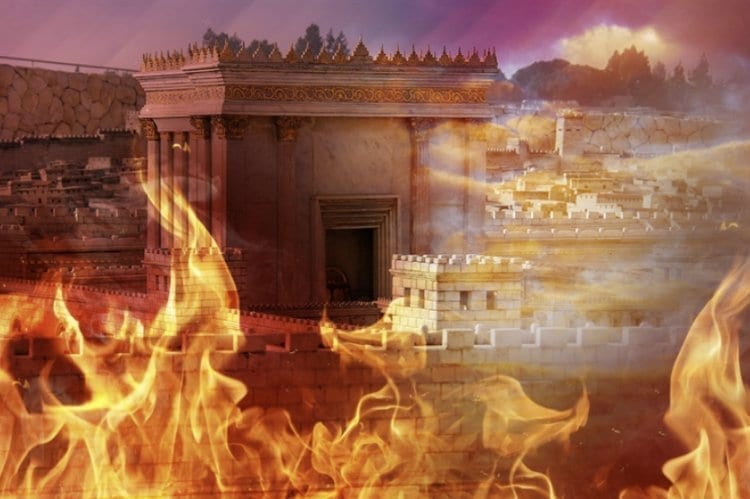We always read parshat Devarim before Tisha B'Av, and although many explanations have been put forward, I would like to suggest another one.
The gemara (Gittin 56) tells us that the second Bet Hamikdash was destroyed because of two men called Kamtza and Bar Kamtza. A certain (unnamed) man threw a banquet and intended to invite his friend Kamtza, but accidentally the invitation went to his enemy Bar Kamtza. When Bar Kamtza appeared at the banquet the host demanded he leave. Since this would be embarrassing for him he offered to pay for his meal, but the offer was refused. He offered to pay for half the banquet or the entire banquet, but the host would not accept his offers and instead had him forcibly removed from the banquet. Because he had been embarrassed, Bar Kamtza incited the Romans against the Jewish People, which soon led to the destruction of the Bet Hamikdash.
One detail of this story which is often overlooked is the attitude of Bar Kamtza in coming to the banquet. If your sworn enemy invited you to a festive meal would you go? Why would you think he invited you? What was Bar Kamtza thinking in going to the meal – didn't he realize that the host had probably made a mistake in inviting him, knowing that there was another man in town called Kamtza (according to some, Bar Kamtza was quite simply the son of Kamtza)?!
It is possible to suggest that Bar Kamtza in fact thought that the host intended to rebuild their connection, and had extended him an olive branch in the form of an invitation to the banquet. That is why he came to the feast, but there was just one problem: the host had no such intentions. If the host had stopped to consider the motives of Bar Kamtza, he might have reached the conclusion that Bar Kamtza was interested in making peace. However, since the host could not begin to imagine building bridges with his sworn enemy, he did not consider this possibility at all. Instead, he insisted on throwing him out, presumably assuming that Bar Kamtza was there to provoke him. This can be classed baseless hatred, since it could easily have been overcome, had the host allowed himself to think beyond his own feelings.
In psychology this is known as projection. The host could not imagine forgiving Bar Kamtza, and he projected this attitude on to Bar Kamtza – in other words, he assumed that Bar Kamtza certainly could not want to forgive him or make peace. This led him to eject Bar Kamtza, and ultimately to the destruction of the Bet Hamikdash. This explanation suggests that it takes two sides to make peace, and moreover, the rejection of peace overtures by one side can in fact intensify the hatred between warring parties. Indeed, Bar Kamtza was so hurt by this rejection, despite having attempted to make peace, that he resorted to the ultimate revenge.
This brings us back to parshat Devarim. When reviewing the story of the spies, Moshe tells the Jewish People they had said, “Because Hashem hated us He took us out of Egypt to leave us in the hands of the Emorites, to destroy us.” (Devarim 1:27) Rashi comments, “…And Hashem loved you, but you hated Him; as the saying goes, 'you think in your heart about your fellow whatever you think is in his heart about you.” Because the Jewish People felt Hashem hated them, they hated Him too. Perhaps we can use the comment of the Seforno on this passuk to add insight: the Jews thought that Hashem hated them because they had worshipped idols in Egypt. They felt guilty, they had let themselves down, and they could not imagine Hashem forgiving them for such a betrayal. The reason for this is simple: if a person is betrayed, it is very hard to forgive! So too, the Jewish People thought that Hashem could not possibly forgive them for having worshipped idols, and therefore He must hate them. This is the ultimate baseless hatred, for it did not even exist – it was totally imagined! They projected their own attitude on to Hashem, reaching the conclusion He must hate them. To this Rashi answers, “No! Hashem loved you, but you thought He hated you!”
We always read this parsha before Tisha B'Av to remind ourselves that we must not fall prey to the same mistake as the generation of the spies. Even if we find it hard to imagine forgiving others, as did the host of the banquet, we must accept in our hearts that others do not have to think and feel just like we do. It goes without saying, then, that we must also work to accept in our hearts that Hashem is merciful and kind beyond all human capabilities, and therefore can even forgive us when we fail and appear to betray Him. One of the brachot of the Shemone Esrei emphasizes the fact that Hashem routinely forgives – we must accept it and believe it. If, on the other hand, we do not accept it we allow ourselves to wallow in guilt and feelings of hopelessness, thinking that we are not worthy of Hashem's forgiveness or love.
The key here is to allow ourselves to step out of our own emotions and think objectively what it must be like from someone else's point of view. If the host had done this, avoiding projecting his own inability to forgive, he might have seen that it was possible to make peace with Bar Kamtza. And if the Jewish People had stepped out of their own guilt and self-doubt they might have realized that Hashem could certainly forgive them for their errors in Egypt when they were surrounded by an idol-worshipping culture and were subjugated by cruel masters day and night.
May we merit to learn from the mistakes of our ancestors, and strive to see the other's point of view, thereby putting an end to the baseless hatred at the root of the destruction of the Batei Mikdash. Then we shall merit to see the rebuilding of Jerusalem and the third Bet Hamikdash bimhera beyamenu Amen!





